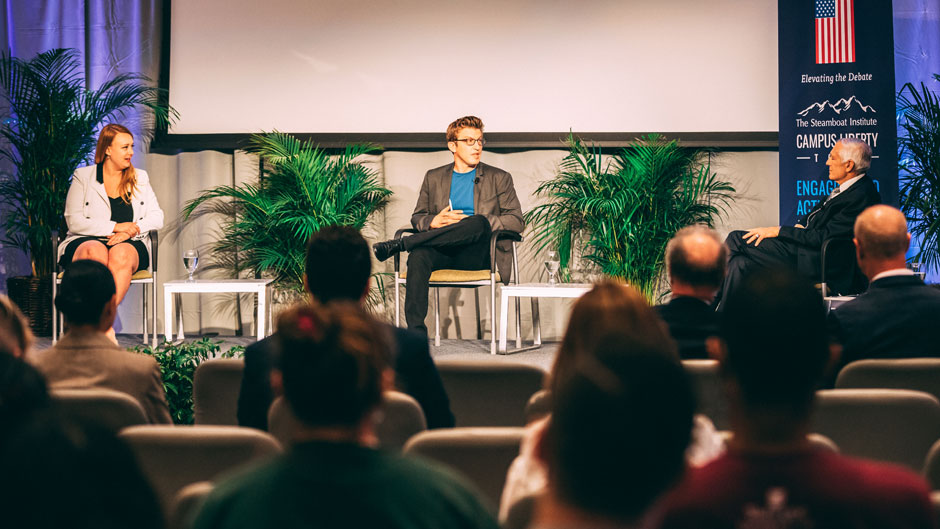Two accomplished speakers with starkly different viewpoints debated Tuesday evening whether the United States needs to keep using fossil fuels to power cars, homes, and industries, despite the damaging effects to the planet.
In an event held at the Donna E. Shalala Student Center at the University of Miami, retired U.S. Army Gen. Wesley K. Clark, who believes it is critical to reduce America’s dependence on fossil fuels, and author and philosopher Alex Epstein, who believes a transition to alternate energy sources would be detrimental to humanity, spent an hour elucidating their perspectives about the impact of fossil fuels to an audience of students, faculty and staff members, and visitors.
Moderated by Jillian Kay Melchior, an editorial page writer for The Wall Street Journal, the event “Should America Eliminate Fossil Fuel Use to Prevent Climate Catastrophe?” was hosted by The Steamboat Institute, an educational nonprofit dedicated to creating opportunities for people to have direct contact with leaders in conservative thought and policy.
“By inviting and engaging in respectful discourse of opposing ideas, we enrich our civil society,” Jeffrey L. Duerk, the University’s executive vice president for academic affairs and provost, said in opening remarks. “Institutions such as the University of Miami play an important role in equipping our citizenry with new perspectives and insights on deeply complex issues. It is through this pursuit of knowledge that we strengthen the next generation of researchers, policy makers, and change agents.”
Clark rose through the ranks of the U.S. Army where he worked for 38 years, even leading U.S. Southern Command. Perhaps most notably, he was Supreme Allied Commander in Europe from 1997 to 2000 and led a NATO combat operation to save 1.5 million Albanians from ethnic cleansing. Today, he guides companies on energy, finance, and security policy as CEO of his own consulting firm and heads an investment bank.
“We’re in the age of oil—that’s what has made our civilization what it is—but there are some drawbacks to that called greenhouse gases,” he said. “Climate change is the toughest problem you could have in a democracy. Because it doesn’t change overnight, but year by year, decade by decade, there is a difference. Your children and grandchildren won’t live in the same world if we don’t come to terms with this problem.”
Epstein’s 2014 book “The Moral Case for Fossil Fuels,” is set to be followed up this spring by “Fossil Future.” He is also founder of the Center for Industrial Progress, a for-profit think tank that seeks to bring about a new industrial revolution. He noted several times that the global idea to transition to net zero by 2050—where carbon emissions would be cut and greenhouse gases would be removed from the atmosphere with new technology—is “a terrible, terrible policy.”
Instead, Epstein said that fossil fuels are the key ingredient that has allowed society to thrive and make machines that can help save us from the effects of climate change. He noted that there are still billions of people across the globe waiting to enjoy things that most Americans take for granted, like electricity, air-conditioning, and refrigerators.
“Fossil fuels are a low-cost reliable energy source that is essential to humans flourishing,” he said. “The world is desperately energy poor, and we are talking about eliminating these things in a world that needs it.”
The two also debated the reliability of climate change projections for temperature increase and sea level rise, both of which Epstein deemed “not credible.” At one point, Clark said that if fossil fuel emissions continue at the same rate, Miami Beach will be underwater in 50 years. Epstein dismissed the idea. “This idea of a catastrophe is a distortion,” he said.
While both agreed that exploring nuclear energy as an alternate power source could be beneficial, Clark touted the growth of alternatives to fossil fuels, like solar and wind energy, and said 10 percent of the power in the United States is now gleaned from these two sources. European nations are installing solar energy facilities to power homes, and some African nations are using solar cells to help people power a stove or charge their cell phones, he reported.
According to Epstein, solar and wind power are still both inefficient and too expensive to support. Instead, he supports a government policy of “energy liberation”—where sources of power are unregulated—and nuclear decriminalization.
Clark countered: “Nothing on this earth is free, but you can’t think of fossil fuels as the only energy source. Solar and wind have gotten more efficient and economical, and they will take us forward into the future. What we have to do is take the evidence and set the right standards, so our children and grandchildren can have the same decent standard of living that we do.”
While a few students in the audience seemed to appreciate the divergent perspective Epstein offered, many said he did not change their mind. They believed in the need to cut fossil fuels to improve the environment and reduce the harmful effects of climate change.
In particular, Kyle Kirejevas, a senior majoring in biology, was incensed by Epstein’s claim that cutting fossil fuels will hinder the world’s ability to produce needed medicines.
“A lot of the drugs we get come from bioharvesting. And because of climate change, we are losing many of the species that we use to develop these drugs,” he said. “Because of climate change [caused by the emissions of fossil fuels], we are losing the opportunity to make medicines, like anti-cancer drugs, which are developed from plant species found in places like the Amazon rainforest.”

